
Vietnam-India diplomatic relations at fifty: Taking stock and looking forward to the future
Latest
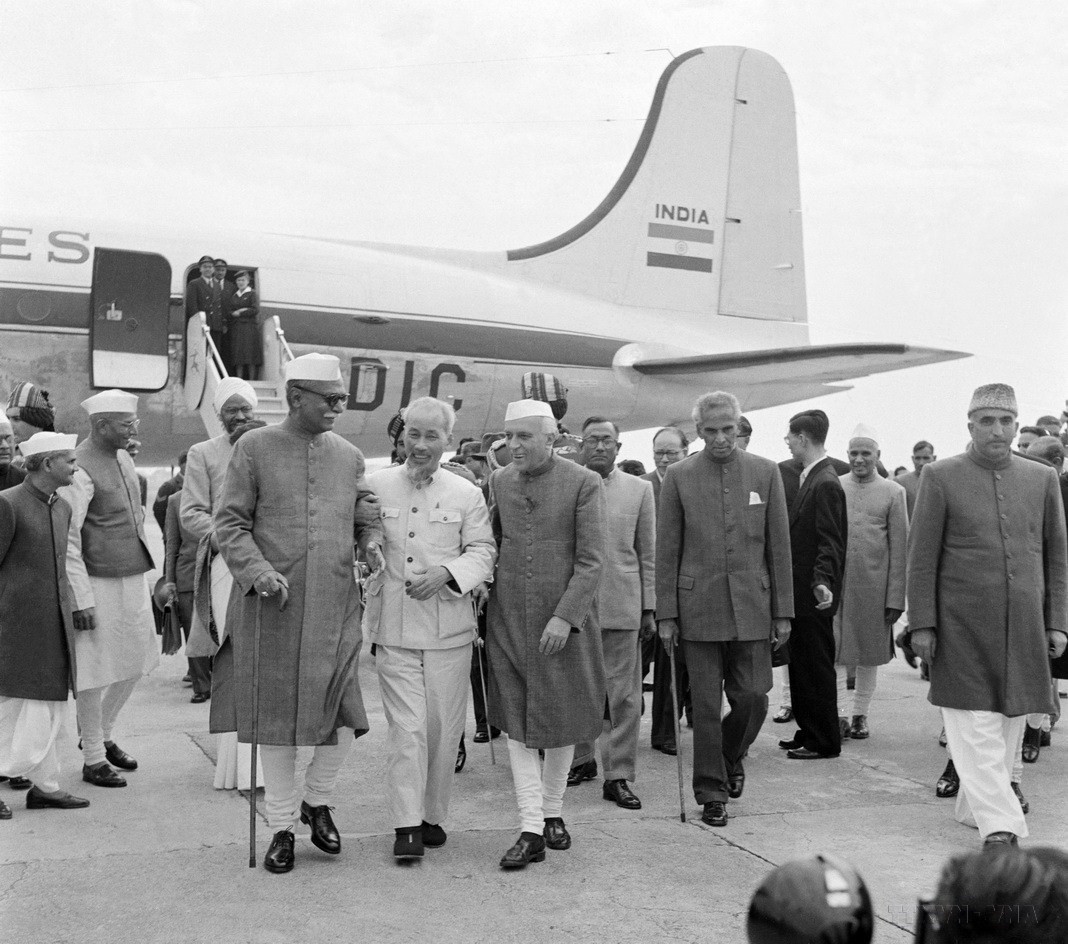 |
| Indian President Rajendra Prasad and Prime Minister Jawaharlal Nehru welcomed President Ho Chi Minh at New Delhi airport for his visit to India from February 5-14, 1958. (Source: VNA) |
The continuous growth of Vietnam-India relations has stemmed from common values, shared interests, and mutual understanding which constitute the "strategic trust" between the two countries.
The year of 2022 marks a significant milestone in Vietnam - India relations as the two countries celebrate the 50th anniversary of the establishment of diplomatic relations (1972-2022). Under the Joint Vision for Peace, Prosperity and People endorsed by Indian Prime Minister Narenda Modi and Vietnamese Prime Minister Nguyen Xuan Phuc in December 2020, the two countries will push for greater cooperation in the coming time with emphasis on “peace” in the pillar of national defense - security partnership, "prosperity" in the economic and technological cooperation, and "people" in people-to-people and cultural exchanges.
Over the past 50 years, generations of leaders of Vietnam and India have constantly cultivated, consolidated, and upgraded the relationship between the two countries, which started with the diplomatic relationship in 1972 and elevated to comprehensive partnership in 2003, to strategic partnership in 2007 and comprehensive strategic partnership in 2016. While international relations have witnessed ups and downs, the Vietnam-India relationship has always been steadily consolidated and developed. Both believe that the other’s prosperity is in the other’s interest, which also contributes to the consolidation of peace in the region and in the world at large.
Partnership for Peace
The partnership for peace between Vietnam and India is clearly demonstrated in defense and security cooperation, the main pillar of the comprehensive strategic partnership between the two countries. Compared with other pillars, cooperation between the two countries in this field started in the latter phrase but has developed rapidly. During the Cold War period, Vietnam and India had little cooperation in defense-security, mainly because of India's non-aligned stance. After 1990, cooperation in the field was initiated and gradually became a particularly important pillar of cooperative relations between the two countries.
In this regard, the first important milestone in this field was the signature of the Memorandum of Understanding on defense cooperation in 1994. Since India successfully tested nuclear weapons in 1998, defense cooperation was officially implemented.
Since then, many visits by high-ranking military leaders of the two countries have been carried out. Notably, in March 2000, Indian Defense Minister George Fernandes visited Vietnam at the invitation of Vietnamese Defense Minister Pham Van Tra.
During this visit, the two sides signed a number of defense cooperation agreements, of which the most important one was the new Protocol on Defense cooperation which prescribed cooperation in institutionalizing the framework for regular meetings at the Defense Minister’s level; conducting regular defense ministerial-level dialogues between Vietnam and India; conducting joint naval exercises; and training Vietnamese pilots by Indian Air Force.
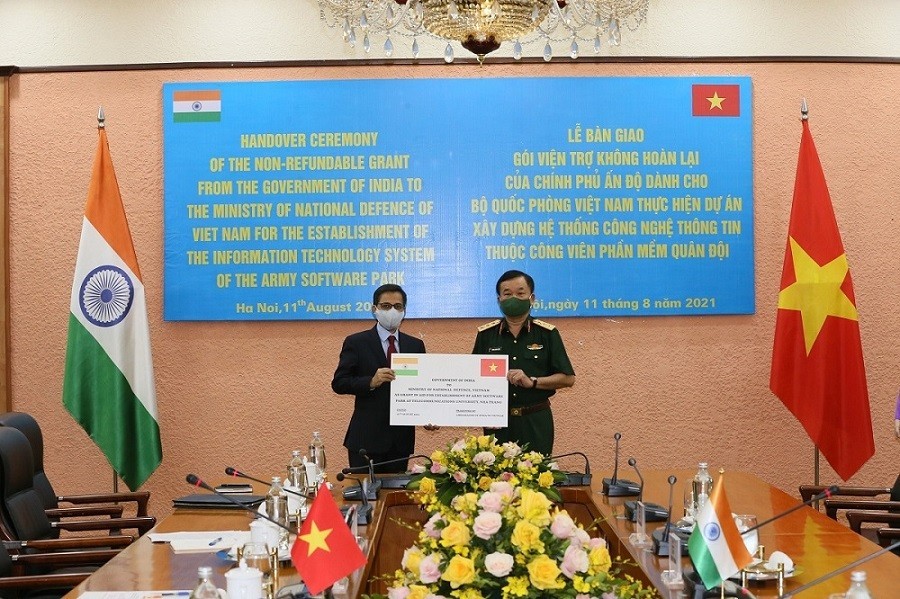 |
| The handover ceremony of the non-refundable grant from the Government of India to the Ministry of National Defense of Vietnam for the establishment of the information technology system of the Army Software Park in Nha Trang, August 2021. (Source: VNA) |
Thereby, India has contributed to bolstering Vietnam’s defense capability and assisted Vietnam's Ministry of National Defense in military training and defense industry. In addition, India has also helped Vietnam upgrade and build a fleet of warships and patrol aircraft as well as trained crews of technicians for the navy, coast guard, air force and experts in the People's Army of Vietnam.
At present, defense cooperation continues to be a key pillar in the Vietnam-India relationship and plays an important role in consolidating peace and stability in the Indo-Pacific region. Defense cooperation between the two countries has been continuously consolidated through a variety of mechanisms and forms of exchange.
Vietnam and India also actively cooperate in the defense industry. India has provided Vietnam with a defense line of credit worth 100 million USD in 2014 to build 12 high-speed patrol boats. Another line of credit of 500 million USD was proposed in 2016 for the purpose of acquiring military equipment from India.
In December 2020, Vietnam and India signed a cooperation agreement, in which India agreed to provide 5 million USD as a contribution of the Indian Government to build a military software park at the National University of Telecommunications in the province of Nha Trang.
On August 11, 2021, in Hanoi, the Embassy of India held a ceremony to hand over a cheque of 1 million USD to the Ministry of National Defense of Vietnam to implement this project. This represented an icon of Vietnam-India defense relations in modern times, broadening opportunities in foreign language and information technology training for Vietnamese men in uniform.
In addition, the two countries also promoted cooperation in the security field, such as counter-terrorism, maritime security, and cyber security. Regarding counter-terrorism, the two countries are cooperating in terms of combating cross-border terrorism, joining the Comprehensive Convention on International Terrorism (CCIT), and preventing terrorist financing.
Regarding maritime security, India and Vietnam conduct the maritime security dialogue. In addition, the two countries have strengthened cooperation to effectively deal with non-traditional security threats, such as climate change, environmental pollution, natural disasters, energy security, and the HIV/AIDS epidemic.
Partnership for prosperity
In the first decades after establishing diplomatic relations, economic cooperation between Vietnam and India was still very limited. Since the mid-90s of the twentieth century, economic cooperation between the two countries has had many positive changes. Along with the achievements of Vietnam's Doi moi and India's economic reforms, the need for economic development has spurred an increasing trade linkage between the two countries.
Efforts to promote bilateral economic cooperation gained new impetus when Vietnam joined the Association of Southeast Asian Nations (ASEAN) in 1995 and the two countries joined the regional cooperation mechanisms of the Indian Ocean - ASEAN, and the Mekong - Ganga Cooperation (MGC) was formed.
Entering the 21st century, Vietnam-India economic relations have achieved many outstanding results in both trade and investment fields. Bilateral trade increased from 237 million USD in the financial year of 2001-2002 to 10 billion USD in the financial year of 2016 - 2017. In the second decade of the twenty-first century, two-way trade turnover between Vietnam and India increased sharply after the ASEAN-India Trade in Goods Agreement (AITIG) took effect and India recognized Vietnam a country with a market economy in 2010.
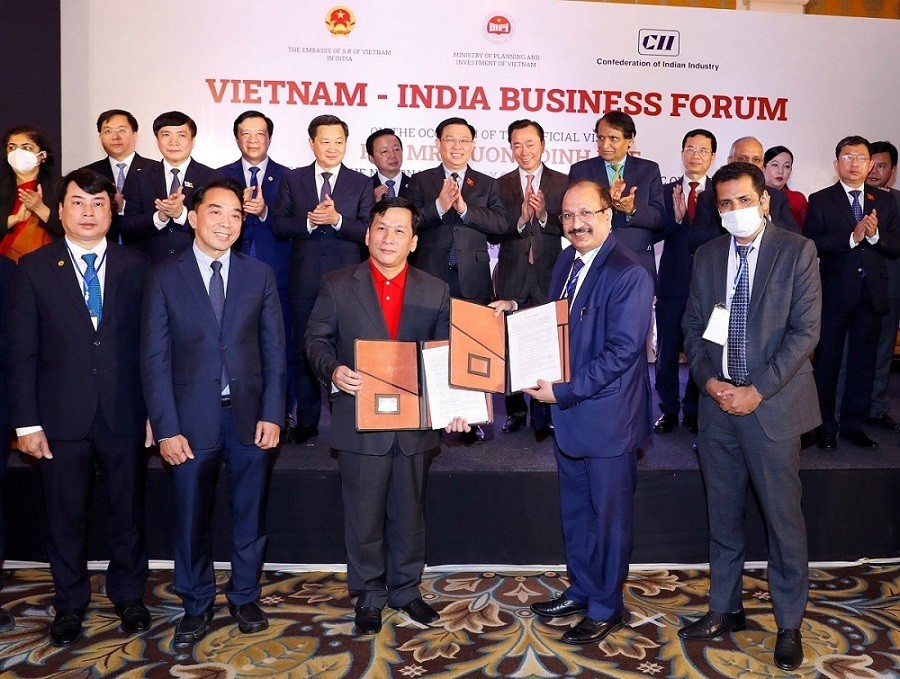 |
| Representatives of Sovico Group and HCL Technologies Limited (India) exchanged cooperation agreements in the presence of National Assembly Chairman Vuong Dinh Hue during his official visit to India, December 2021. (Source: VGP) |
In 2013, Vietnam's exports to India accounted for three-quarters of its total exports to South Asian countries. In 2015, India was Vietnam's 17th largest export market, while on the other hand, India was Vietnam's 11th largest source of imports.
Since 2016, with the upgrading of the bilateral relationship, promoting economic cooperation is one of the strategic goals of the two countries. Vietnam has become increasingly important in India's Act East policy and is an important pillar of India's relationship with ASEAN.
Currently, Vietnam is India’s 18th largest trading partner globally and its 4th largest trading partner in ASEAN, after Singapore, Indonesia and Malaysia. For Vietnam, India is its 7th largest trading partner, its 7th largest source of imports and its 9th largest export market globally.
In 2021, bilateral trade exceeded 12 billion USD. The two countries have made every effort to implement comprehensive measures to achieve the goal of bilateral trade exchange of 15 billion USD at the earliest possible.
Regarding investment, India was one of the first countries to invest in Vietnam. Since the 1990s, although India has suffered from insufficiency of capital and also needed to attract foreign investment, almost every year India gave Vietnam certain credit loans.
For example, in the years 1996-2001, India gave Vietnam a credit equivalent to 12-15 million USD for imports of equipment for agricultural projects, agricultural product processing machines, the metallurgical industry, and the manufacture of railway wagons and spare parts...
Currently, according to the Foreign Investment Agency, Ministry of Planning and Investment of Vietnam, as of February 2022, India ranked 25th out of 140 countries and territories investing in Vietnam, with 315 projects still in effect, with a total capital of more than 18 million USD with special focus on processing, manufacturing, power generation and electricity distribution and mining industries.
India's investment projects mainly focus on the processing and manufacturing industry with 60 projects of total investment capital amounting to 459.67 million USD, accounting for 50.5% of investment capital. Next is power generation and electricity distribution with 6 projects, total investment capital of 236.3 million USD, accounting for 26% of total investment capital. Mining ranked third with 5 projects, total investment capital is 96.5 million USD. Some typical projects of India in Vietnam can be mentioned, such as Son Hoa Sugar Factory Project (Phu Yen), Infra Solar Power Plant Project (Ninh Thuan) and TATA Co., Ltd. Coffee Vietnam (Binh Duong).
In the field of science and technology, Vietnam and India are well aware of the importance of this sector from quite an early time and have signed a number of cooperation agreements. The first scientific and technical cooperation agreement between Vietnam and India was signed in 1978 to establish the Joint Committee on Science and Technology and renewed in 1996. Under this agreement, the joint committee was tasked with overseeing the implementation of the cooperation. As a result, Vietnam-India scientific and technical cooperation was promoted in the late 1990s and the first decade of the twenty-first century.
Since then, cooperation in training human resources in science and technology has been prioritized and has become one of the effective fields of cooperation between the two countries. Every year, the Government of India grants scholarships to Vietnamese students under different programs, including ITEC (Indian Technical Economic Cooperation), CEP (Cultural Exchange Program), GCSS (Join Cultural Exchange Plan), EEP (Educational Exchange Program), MGCSS (Mekong - Ganga Academic Cooperation Plan), and Buddhist scholarship.
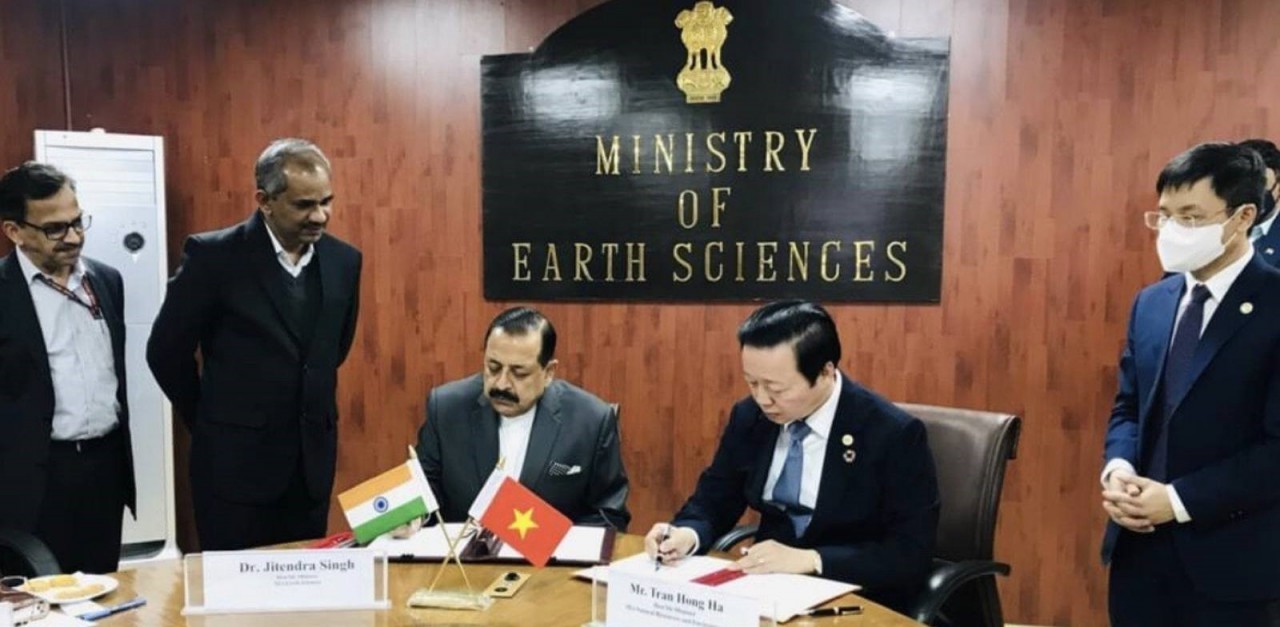 |
| Minister of Natural Resources and Environment Tran Hong Ha and Indian Minister of Earth Science Jitendra Singh signed the Memorandum of Understanding on cooperation in the field of marine science and marine ecology, December 2021 in New Delhi. (Source: VNA) |
On the occasion of the official visit of Indian Prime Minister Narendra Modi to Vietnam in September 2016, another milestone of the science - technology cooperation between Vietnam and India was the signature of 13 cooperation agreements, including an agreement on cooperation in the exploration and use of outer space for peaceful purposes; cooperation on information technology, network security, peaceful use of atomic energy, agreement on building information infrastructure for high-quality information technology training, cooperation agreement on academic cooperation between the Vietnam Academy of Social Sciences (VASS) and the Indian Council of World Affairs (ICWA)...
In January 2018, during Prime Minister Nguyen Xuan Phuc's visit to India, the two countries signed a cooperation agreement between the Indian Space Research Organization and the Vietnamese Ministry of Natural Resources and Environment on the establishment of a satellite tracking and remote sensing center in Vietnam within the framework of space cooperation between India and ASEAN.
Up to now, key science and technology cooperation projects between the two countries have been in the field of research and application of nanotechnology in the production of materials, defense equipment, healthcare, agriculture, and information technology, telecommunications, chemicals; biotechnology including molecular biology, agricultural biotechnology, biotechnology in medicine and in environmental services; oceanography, including earthquake and tsunami warning, seismic exploration in the ocean.
Among these areas, cooperation in the field of agricultural biotechnology has been particularly valued by Vietnam in the period before 2010 as one of the decisive factors for the restructuring process of the country's agriculture. In the last decade or so, Vietnam-India science and technology cooperation not only continues in the traditional realms but also expands to new areas such as renewable energy, high technology, and space technology.
Currently, both Vietnam and India have attached importance to science and technology in their development strategies. Vietnam's five-year development plan and Development Strategy toward 2030, which was approved at the 13th National Congress of the Communist Party of Vietnam, gave emphasis on science and technology. In the "Self-Reliant India" program to turn India into a "great power" with a GDP of US$5 trillion, India has also given priority to science and technology and innovation development. Therefore, in the Vietnam-India relationship, the two countries believe that it is necessary to foster deeper and closer cooperation in this field.
Partnership for people
The Vietnam-India comprehensive strategic partnership is also considered a partnership for "people". Addressing the National Assembly of Vietnam on the occasion of his official visit to Vietnam in November 2018, Indian President Ram Nath Kovind affirmed "After all, the human connection network between Vietnam and India... is the foundation of our partnership”.
This understanding is also confirmed in the “Viet Nam-India Joint Vision Statement for Peace, Prosperity and People” signed on December 21, 2020. For the first time, "people" became the mainstay of the bilateral relationship between Vietnam and India in the official documents of the two countries.
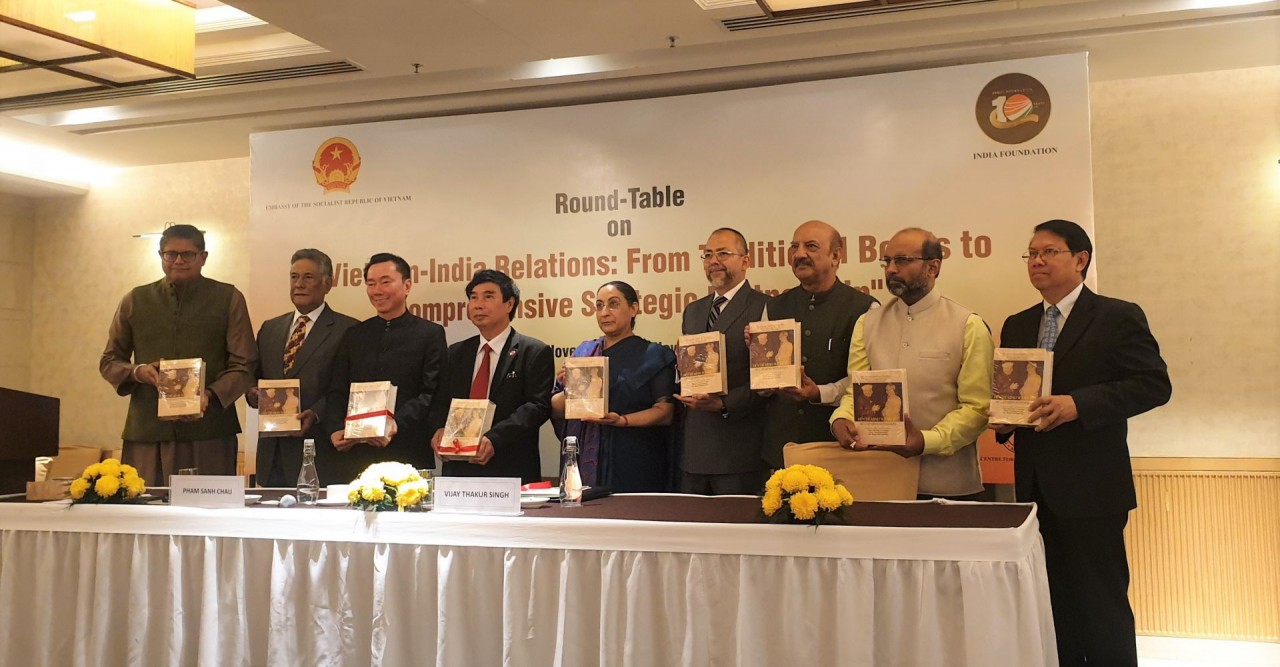 |
| Launching ceremony of the book "Ho Chi Minh with India" in New Delhi, November 2021. (Photo: D.H) |
In the Vietnam-India relationship, it was the Great Leaders of the two nations, such as President Ho Chi Minh, Mahatma Gandhi, and Prime Minister Jawaharlal Nehru, who laid the foundation and inspired the development of bilateral relations.
In recent years, many activities to celebrate the birthdays of Leader Mahatma Gandhi and President Ho Chi Minh have once again connected Vietnam and India. In August 2018, the Mahatma Gandhi Memorial was erected at the Indian Embassy in Hanoi. On September 2, 2021, a Memorial to President Ho Chi Minh was erected at the Vietnamese Embassy in New Delhi. These monuments, not only honor the great national heroes of the two countries but are also symbols of national culture and messages of peace.
Connecting people through Buddhism is also seen as an example of the deep attachment between Vietnam and India. Before the two countries established official diplomatic relations, there were a number of monks and nuns from Vietnam to India to study Buddhism. In the following years, hundreds of Vietnamese monks, nuns and Buddhists went to India to study Buddhism in many different universities in India, laying a solid foundation for connections between the two countries today.
Cooperation prospects
Vietnam-India relations in the coming time will continue to be affected by the requirements set forth by the situation and development goals of each country. Vietnam's five-year plan of 2021 - 2025 and Development Strategy towards 2030, outlined at the 13th Party National Congress, show that there are many points of convergence with India's vision and development goals. Vietnam and India are both ambitious countries with young populations. Vietnam aspires to become a high middle-income country by 2030 and a developed country by 2045 through comprehensive development in all fields, including science - technology, education- training, which are priority areas. These are the areas where India has strengths and the two countries can advance their cooperation.
The two countries will also work together on maritime security, contributing to the promotion of peace, stability and development in the Indo-Pacific region. In regional and multilateral cooperation, the two countries continue to support each other in regional, Asian and international forums; support multilateralism, respect international law, rules-based order, and seek peaceful resolution of disagreements.
For the stronger development of the Vietnam-India comprehensive strategic partnership, in the coming time, the two countries will focus on the following priorities: Firstly, connectivity, including road connectivity, by sea and by air, engaged in online business; tourism and people-to-people exchanges; secondly, develop a goal-oriented blueprint to strengthen trade and new supply chains, promote development partnerships, and commit to the sustainable development goals; thirdly, promoting defense industry cooperation, promoting new partnerships - cyber security, maritime security, disaster preparedness; fourthly, cooperation in science - technology, information and communication technology, space, civil nuclear, renewable energy, digital economy; fifthly, to promote practical cooperation in the Indo-Pacific region based on the convergence between the “ASEAN Outlook on the Indo-Pacific” (AOIP) and the India’s Indo-Pacific Oceans Initiative (IPOI); strengthen strategic partnerships on regional and global issues.
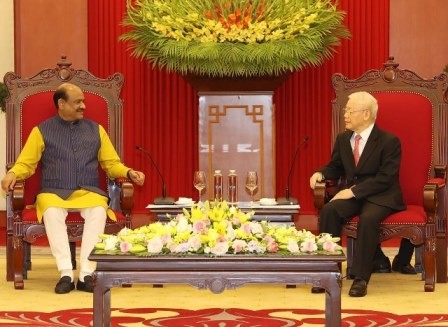 |
| Party General Secretary Nguyen Phu Trong receives Speaker of the Indian Lok Sabha (Lower House) Om Birla in Ha Noi on April 20. (Photo: VNA) |
It can be said that, in the half century since Vietnam and India established diplomatic relations, the relationship between the two countries in all fields has made great strides. The change and development in the relationship between the two countries reflects the changes in a globalized world and deeper international integration.
Over the past 50 years, although the situation of each country, the region and the world has constantly changed, the relationship between Vietnam and India has remained "as clear as a cloudless sky". The Vietnam-India Joint Vision Statement for Peace, Prosperity and People continues to fulfill its historic role, covering all areas of the Comprehensive Strategic Partnership between the two countries.
With the outcomes of cooperation between the two countries achieved in the past 50 years, it can be believed that the Vietnam-India relationship will grow stronger in the future, meeting the expectations of the Government and the people of the two countries in the new era.













